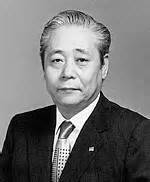Dear Candidates Faculty & Friends,
 Please allow me to wish each and everyone of you a successful 2015. To our candidates I ask that you rededicate yourself to your studies for the New Year and remember that all good things come from hard work and persistence. The following discussion is based on the 12 months of the year and some thoughts for you to consider. Hopefully, it provides some guidance and encouragement as you move through your studies in 2015. Each of you is unique and important and it is you who make Monarch a special place to learn and work. On behalf of Monarch, I want to thank you for being our student candidates and we look forward to your continued success and getting to know each one of you even better. I attach a quote from Ryuzaburo Kaku, former Chairman of Canon, entitled: ?The Path of Kyosei?, where he speaks of the world?s most powerful corporations working for the advancement of peace and prosperity. Let us not forget that the skills that we learn at Monarch should ultimately be used for the same purpose: to build a better world through cooperation. Let us truly rededicate ourselves to this noble cause and stand as leaders in our communities as we move through 2015.
Please allow me to wish each and everyone of you a successful 2015. To our candidates I ask that you rededicate yourself to your studies for the New Year and remember that all good things come from hard work and persistence. The following discussion is based on the 12 months of the year and some thoughts for you to consider. Hopefully, it provides some guidance and encouragement as you move through your studies in 2015. Each of you is unique and important and it is you who make Monarch a special place to learn and work. On behalf of Monarch, I want to thank you for being our student candidates and we look forward to your continued success and getting to know each one of you even better. I attach a quote from Ryuzaburo Kaku, former Chairman of Canon, entitled: ?The Path of Kyosei?, where he speaks of the world?s most powerful corporations working for the advancement of peace and prosperity. Let us not forget that the skills that we learn at Monarch should ultimately be used for the same purpose: to build a better world through cooperation. Let us truly rededicate ourselves to this noble cause and stand as leaders in our communities as we move through 2015.
With Best Wishes,
Dr. Henderson
 ?Because multi-million dollar corporations control vast resources around the globe, employ millions of people, and create and own incredible wealth, they hold the future of the planet in their hands. Although governments and individuals need to do their part, they do not possess the same degree of wealth and power. My point is this: If corporations run their businesses with the sole aim of gaining more profits, they may well lead the world into economic, environmental and social ruin. But if they work together, in a spirit of Kyosei, they can bring food to the poor, peace to war-torn areas, and renewal to the natural world. It is our obligation as business leaders to join together to build a foundation for world peace and prosperity.?
?Because multi-million dollar corporations control vast resources around the globe, employ millions of people, and create and own incredible wealth, they hold the future of the planet in their hands. Although governments and individuals need to do their part, they do not possess the same degree of wealth and power. My point is this: If corporations run their businesses with the sole aim of gaining more profits, they may well lead the world into economic, environmental and social ruin. But if they work together, in a spirit of Kyosei, they can bring food to the poor, peace to war-torn areas, and renewal to the natural world. It is our obligation as business leaders to join together to build a foundation for world peace and prosperity.?
Ryuzaburo Kaku-Former Chairman Canon
1. January: Re-Commitment: In starting the New Year it is time to recommit yourself to your academic training and your dissertation work. However, it is important to understand that as a serious graduate students we MUST recommit ourselves to our studies every day. Each day in the new year from January through the end of December, I challenge each of you when waking up each day to recommit yourself to your studies and your thesis work. See each new day as an opportunity to push your studies and thesis to new heights and find something new. Read and write something new everyday even if you do not go to the library or cannot find yourself in your special study space. Carry your notebook with you everywhere and write down your important thoughts before they are lost. When communicating with your supervisor listen to them, really listen, be attentive, throw-away your ego. Do not just sleepwalk through your classes, studies and thesis. If you are going to be there, then BE there, fully involve yourself.
2. February: Expectations: Try not to expect rewards. Buddhists tell us that disappointment comes from unfulfilled expectations and that we cause ourselves pain by holding expectations that ultimately do not come to pass. Try as best you can not to hold unrealistic expectations of yourself and of others that will only bring disappointment. See the world for what it is and not for an illusion. Jack Welch, the famous Chairman of GE once said: ?Face reality as it is, not as it was or as you wish it to be?. Unwarranted expectations are a road to unhappiness. Moreover, in your academic training do not expect reward. This might sound counter-intuitive but it is true. Study for the love of academics and knowledge itself and the rewards will come. Be patient and move through your studies in a decisive and dedicated manner. Without expectations other than the knowledge you gain your lessons will be mastered quicker, you will be a greater success and you will find greater happiness in your studies.
3. March: Honor: Honor your studies, honor your teachers, honor your colleagues, honor yourself. Honoring your study, those around you and yourself is a challenge for everyone and something we must always keep in the forefront of our thoughts. It is important to realize that many have come before and that they have dedicated their lives to your study domain or field of study. Your teachers and supervisors are living examples of this and it is right to honor them. They teach with a level of selflessness that should be recognized and respected. The role of the teacher is a sacred position often undervalued in today?s society where acquiring something is fast and easy. Academics, especially at a high level, are not this way. Do not be tricked by this modern view and see the true value in your studies. Honoring yourself means not to be too hard on yourself. Recognize that you bring your efforts, emotions, intellect and spirit to your academic training. Often we are our worst enemy. We are too hard on ourselves and we prevent ourselves from creating a positive environment in which to learn. If you are always feeling that you are not good enough then it will be so. So honor yourself by keeping a positive attitude and remind yourself of the sacred nature of your academic studies.
4. April: Train The Body: No matter the age we should train our body in order to keep the intellect and spirit strong and alive. Try to understand and see insight into the body-mind-spirit interrelationship. A strong body is the basis on which to build and you must take the time to keep up your physical fitness. Without the foundation of a physically fit body the benefits of academics can be lost. Of course, as you age the body will deteriorate and illness may happen. Training the body means to work with the body you have. If you have challenges work around them. Respect your challenges. Do not try to be someone else. Be the best that YOU can be. Push your own limitations in a way that YOU will make steady progress.
5. May: Educate The Mind: The first aspect of training the self is physical. The second aspect is mental. With a physically fit body you can now go about training the mind and the intellect. Training the mind and the intellect means to go out and investigate your study domain in a structured way. Try to learn as much as possible of your domain. Don?t just settle on learning the minimum required. Read as many books and articles as possible. Investigate with others. In particular, learn the history of your domain of study. Learn where your study domain came from. Learn what other study domains the seminal authors in your field learned. Broaden your appreciation for academics in general and not just your own study domain. Try to understand how your study domain fits into the larger academic world and how it gives direction to your studies and your life.
6. June: Polish The Spirit: The first aspect of training the self is physical. The second aspect is mental. The third aspect is the spirit. With a strong physical regime, the proper intellectual attitude and with years of study you will come to see how your study domain provides a deep foundation for all aspects of your academic life. With this understanding a new refinement to your studies will become apparent. With this realization a new responsibility is also opened up. The responsibility to safeguard and to continually polish your spirit to be the very best in your studies that you can be will become an overriding imperative. Many academics do not reach this stage, they attain some success and then muddle their way forward losing their focus and determination. It requires unswerving dedication, continual re-commitment, and a great deal of honesty as to one?s own effort. Do not hold illusions about your studies and training and be honest with yourself, see your effort for what it truly is and commit yourself to continually improve. Appreciate that the world is a complex interwoven dynamic and that your study domain is affected by it as well as it has an effect on it. See the mystery and hidden challenges in what you are studying. Understand that the effort you put into your study domain and your dissertation can have real impact on others. Understand that your dissertation connects you in a very personal way to other fellow academics past, present and future.
7. July: Follow The Way of the Sword: Often graduate students go about their studies in a haphazard way. They move from one topic to the next without any real plan. Following the Way of the Sword means to be precise in your intent and in the steps you take to master your domain. Know what you wish to study, understand your study domain, know where your study domain begins and ends and stay on point. Don?t waste your precious time on topics or items that detract from your studies and the achievement of your goals. Be an academic swordsman: precise, dedicated, unwavering and cut through the noise to expose the truth.
8. August: Do Not Show Fear: Undertaking a Graduate or Doctoral program can be scary. Often, we have no choice but to face our fear of failure. Sometimes this can happen several times within the same program. Be brave and believe in yourself. If you do not face your fears it means you are not growing and you are simply trying to remain in your comfort zone. To grow academically means to push yourself and embark on bigger and more complex tasks. Nothing great was ever achieved by people staying in their comfort zone. So, understand that the fear of failure is really just you believing in yourself and pushing yourself forward into new experience. This makes you special and sets you apart from the crowd. Be proud of yourself.
9. September: Always Remain Positive: Life is difficult. Only death is easy! Understanding this is the first aspect we must recognize in order to lead a happy life. Once we realize that life is difficult and can not be always good, then we must make a decision as to how we wish to face life and the difficulties and trials that will no doubt arrive. The attitude that you strike in life will be the major determinant as to whether you are a success in your pursuits or not. Do not fall prey to doubt and self-doubt, remain positive, reinforce yourself, and understand that you have all the necessary attributes to be a success. Surround yourself with positive people and stay away from naysayers. This is especially true in a Doctoral program that can last 36, 48 or even 60 months. It is simply a matter of doing. Always remember that it is not that you can?t, it is that you choose not to. Everything is a choice and you must recognize that you are the one making the choice, the responsibility remains with you. Life does not choose for you, you choose how you will react.
10. October: Always Be Persistent: Being persistent in your goals is one of the top characteristics you must cultivate to be a success at a high level in academics. Do not be hot and cold in life and do not let adversity push you away from achieving your goals. As we said, adversity will come so you should see it as a test. Do not give up. There is a famous Japanese saying: ?Seven times fall down, eight times get up?. Imagine a Judo player or wrestler who would get discouraged each time they were thrown to the mat. They would not last long. You must truly keep this saying close to heart and reflect on its meaning for yourself. We have all heard the stories of great thinkers and inventors that when faced with innumerable failures they kept on going until they were successes. Failure will come. So choose to face it with an unwavering spirit and continue to build and move forward.
11. November: Remain Humble: Humility means to understand your own situation in respect to others. Humility is often the virtue that is most abused, especially in the modern world where being forceful towards others and getting what you believe to ?deserve? is an admired trait. Humility is intricately related to self-honesty. Without self-honesty you can not cultivate the virtue of humility. For academics humility comes in understanding your rank and place in the organization and domain of knowledge. More subtly it is the understanding that we do not achieve anything of our own. All knowledge, skill and understanding is acquired and built on the shoulders of others and we must recognize this to be so. We must see that even when we give 100% of our effort and energy this is only possible due to the assistance and help of others. So honor the other people in your life that help to make your success a reality, be honest with yourself and others as to your own contribution and you will be able to cultivate a humble nature both personally and academically.
12. December: Gratitude And Giving Thanks For Your Study: It is most important that we do not forget to give thanks each time we study. Many schools ritualize this by thanking each participant at the close of each class, symposium or special seminar. Thank your professors for the time they spend with you. When you think about it, it takes a lot for even one study session or symposium to take place. If you are a seminar of 20 individuals then the schedules of 20 people must intersect in order for the seminar to take place. And this ignores all the past connections that had to happen in order for the present to transpire. Think about the many classes of your teacher and his teacher that had to happen to make yours possible. There is a long history of events that had to happen for your seminar, symposium or study period on any given day to take place. When keeping in mind all that has gone before us and the effort of others that has been made to keep our study domain alive we must really recognize the special nature of it. So, as you train yourself academically keep in mind how lucky you are to have been given the opportunity to study, learn and eventually be a leader of your community. Think of the multitude of people who do not have this opportunity to learn. Always remember that your teacher will not always be there, one day they will be gone. Your classmates will not always be there, one day they will be gone. Each class, seminar or symposium is a special mix of individuals, a special time and place for you to perfect your studies and yourself. See it as unique and remain thankful that we are given the opportunity for continued growth and personal development.
